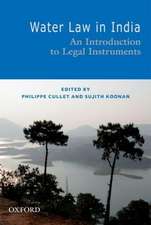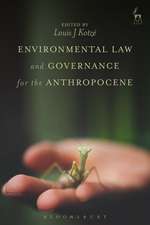Integrating Ecology and Poverty Reduction: Ecological Dimensions
Editat de Jane Carter Ingram, Fabrice DeClerck, Cristina Rumbaitis del Rioen Limba Engleză Paperback – 13 apr 2014
| Toate formatele și edițiile | Preț | Express |
|---|---|---|
| Paperback (2) | 946.72 lei 43-57 zile | |
| Springer – 25 ian 2014 | 946.72 lei 43-57 zile | |
| Springer – 13 apr 2014 | 952.09 lei 43-57 zile | |
| Hardback (2) | 950.52 lei 43-57 zile | |
| Springer – 16 noi 2011 | 950.52 lei 43-57 zile | |
| Springer – 15 feb 2012 | 956.03 lei 43-57 zile |
Preț: 952.09 lei
Preț vechi: 1161.08 lei
-18% Nou
Puncte Express: 1428
Preț estimativ în valută:
182.18€ • 190.72$ • 150.74£
182.18€ • 190.72$ • 150.74£
Carte tipărită la comandă
Livrare economică 07-21 aprilie
Preluare comenzi: 021 569.72.76
Specificații
ISBN-13: 9781489994288
ISBN-10: 1489994289
Pagini: 448
Ilustrații: XX, 428 p.
Dimensiuni: 155 x 235 x 24 mm
Greutate: 0.64 kg
Ediția:2012
Editura: Springer
Colecția Springer
Locul publicării:New York, NY, United States
ISBN-10: 1489994289
Pagini: 448
Ilustrații: XX, 428 p.
Dimensiuni: 155 x 235 x 24 mm
Greutate: 0.64 kg
Ediția:2012
Editura: Springer
Colecția Springer
Locul publicării:New York, NY, United States
Public țintă
Professional/practitionerCuprins
From the contents
Foreword - Importance of ecology to poverty reduction.- Part 1: Introduction.- Part 2: The Ecological Dimensions and Solutions to Global Development Challenges. Section 2.1. Hunger. Section 2.2. Water Resources. Section 2.3. Human Health. Section 2.4. Energy. Section 2.5. Disasters. Section 2.6 Climate Change. Section 2.7. Education. Section 2.8. Gender equality. Section 2.9. Synthesis of Direct Application of Ecological Theory.- Part 3: Mediating Forces for Leveraging Ecology towards Poverty Reduction in a Globalized World. Section 3.1. Population. Section 3.2. Ecological Restoration. Section 3.3. Financing. Section 3.4. Economics: Payments for Ecosystem Services. Section 3.5. Governance & Social Movements. Section 3.6. International Policy Mechanisms. Section 3.7. Synthesis of Mediating Forces.- Part 4. Conclusions.
Notă biografică
The three editors of this volume, Jane Carter Ingram, Fabrice DeClerck, and Cristina Rumbatis del Rio, have collaborated on multiple projects addressing the role of ecology in poverty reduction and began working together at the Earth Institute of Columbia University. Their educational and professional backgrounds in ecology, geography, and sustainable development have served as the inspiration for this book and their professional pursuits. The editors hope that the issues presented and explored in this volume will serve to encourage ecological scientists and practitioners in international development fields to collaborate together to identify creative, sustainable and viable solutions to challenges preventing poverty alleviation around the world. J. Carter Ingram is the lead of the Ecosystem Services and Payments for Ecosystem Services group at the Wildlife Conservation Society in New York, NY. Cristina Rumbaitis del Rio is an Associate Director at the Rockefeller Foundation in New York, NY (USA). Fabrice DeClerck is a professor of community and landscape ecology at CATIE in Costa Rica.
Textul de pe ultima copertă
Integrating Ecology and Poverty Reduction offers a timely assessment of the current and potential role of ecological science and tools for contributing to poverty reduction. The chapters in the first volume, Ecological Dimensions, address the ecological apsects of major development challenges and the contributions of ecological science to solving these problems. In the second volume, Application of Ecology in Development Solutions, authors address the roles and limitations of ecological science in creating longterm sustainable solutions to some of those problems and the social, economic and governance factors that mediate the implementation of these solutions.
Integrating Ecology and Poverty Reduction is designed to illustrate the opportunities for ecological science to contribute to international development challenges and solutions; to foster new ways of thinking about the relationships between humans and the ecosystems in which they live; and to explore the tradeoffs and advantages in using an ecological approach to addressing poverty in a world of increasing population, high rates of poverty and continued ecological degradation. The issues addressed and explored by experts in ecology and international development fields will be especially relevant for students and professionals interested in the intersection of poverty reduction and environmental sustainability.
About the Editors
J. Carter Ingram is the lead of the Ecosystem Services and Payments for Ecosystem Services group at the Wildlife Conservation Society in New York, NY. Fabrice DeClerck is a professor of community and landscape ecology at CATIE in Costa Rica. Cristina Rumbaitis del Rio is an Associate Director at the Rockefeller Foundation in New York, NY.
Integrating Ecology and Poverty Reduction is designed to illustrate the opportunities for ecological science to contribute to international development challenges and solutions; to foster new ways of thinking about the relationships between humans and the ecosystems in which they live; and to explore the tradeoffs and advantages in using an ecological approach to addressing poverty in a world of increasing population, high rates of poverty and continued ecological degradation. The issues addressed and explored by experts in ecology and international development fields will be especially relevant for students and professionals interested in the intersection of poverty reduction and environmental sustainability.
About the Editors
J. Carter Ingram is the lead of the Ecosystem Services and Payments for Ecosystem Services group at the Wildlife Conservation Society in New York, NY. Fabrice DeClerck is a professor of community and landscape ecology at CATIE in Costa Rica. Cristina Rumbaitis del Rio is an Associate Director at the Rockefeller Foundation in New York, NY.
Caracteristici
Explores the role of ecology in addressing the many dimensions of poverty alleviation, such as health, hunger, economic well-being, gender, disasters, water, sanitation, energy needs, infrastructure development and livelihood diversification Includes supplementary material: sn.pub/extras













